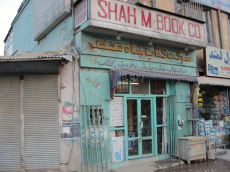
Terms such as “criminal” and “illegal” are commonly applied to the various publications and books Sultan collects – unsurprisingly since many works were banned under the Taliban. But the book also attempts to show how the language of criminality is also applied on a cultural rather than legal level in Afghan society to private desires , particularly of a sexual nature, as well as when characters act out modern forms of courtship, which suggests the presence of such desires. At the opening of the chapter named ‘Suicide and Song’, it is said that “a woman’s longing for love is taboo” and that “love can be interpreted as committing a serious crime, punishable by death” – the last part of this quote probably a reference to honour killings (41).
In the previous chapter we hear about the story of a sixteen year old girl called Saliqa, who is half beaten to death by her uncle after it is discovered that she has spent half an hour talking to a young man named Nadim in a public park and we are told that, “Before long everyone knew of Saliqa’s crime. The crime that caused her to lie locked in her room”. A whole conversation between the women in the family is dedicated towards discussing whether, quote, “she was merely disobedient or [whether] she had committed a serious crime” (36).
This in turn leads Sharifa, Sultan’s first wife, to contemplate the fate of another young woman called Jamila, who was smothered to death on the orders of her own mother, after it had been found out that she’d been conducting an extra-marital affair, which Sharifa considers to have also been “a serious crime”, though she concedes it was done “more from ignorance than a wicked heart” (38). And this use of the language of criminality is not confined to the thoughts and actions of women. When Mansur, Sultan’s oldest son, is taking a girl out to dinner, it is described as “His first date. His absolutely illegal date” (113).
In tandem with this, showing a lack of desire or assertiveness is seen as virtuous. For instance, when Sultan and Sharifa go to thirteen year-old Belqisa’s family to ask for her hand in marriage on behalf of Yunus, Sultan’s younger brother, and the girl herself starts crying Sharifa is pleased by this since it is considered, quote, “a good sign when the bride is unwilling. [It] indicates a pure heart.” (55) By focusing on such events in the book and drawing attention to the way in which they are perceived it seems that Seierstad is trying to drive home the message that the idea of individual agency, people acting on their inner wants and desires, was consistently supressed in the Afghan community in which she lived for three months, particularly for women.
As Carol Bere writes in the Women’s Review of Books, “Women’s rights to freedom, to personal choices – whether in work or in marriage – and to education in a country where the literacy rates for women are marginal, are certainly the subtext, indeed the implicit argument of The Bookseller of Kabul” (17).
However, whilst upon publication the book garnered positive reviews from papers such as the Guardian, with critic Tim Judah complimenting Seierstad on making “the difficult decision to tell it how it was”, calling it “compulsive, repulsive and frightening”, other critics, particularly from Norway, took issue with it. In his summary of the controversy surrounding the book, for instance, Knut Christian Myhre even implied it was possible that “Seierstad’s representation of ‘the Afghans’ as a totalitarian-minded people hell-bent on subjugating women provided a rationalization for Norwegian participation in a Western neo-colonial project in the Middle East” – referring to Norway’s involvement in the US-led intervention in Iraq in 2003.
Yet the heated debates which were had after the book was first published arguably only make this an even more worthwhile book to read.
Image: By Michal Hvorecky from Slovak Republic (Shah M Bookstore in Kabul) [CC BY 2.0 (http://creativecommons.org/licenses/by/2.0)], via Wikimedia Commons

0 Comment:
Be the first one to comment on this article.